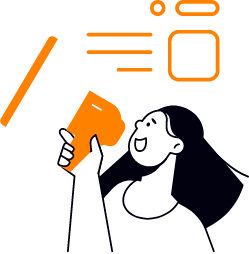
Wenew: on the anniversary of the ecosystem, find out more about the steps we've taken towards a more circular and sustainable future
*By Fabiana Quiroga, Director of Circular Economy at Braskem in South America
Wenew, our circularity ecosystem, is celebrating its first year running. Marking this moment means a lot to me, as I have worked at Braskem for over a decade and an important part of this time has been leading the company's Circular Economy area.Wenew, our circularity ecosystem, is celebrating its first year running. Marking this moment means a lot to me, as I have worked at Braskem for over a decade and an important part of this time has been leading the company's Circular Economy area.
This first year of Wenew highlights an essential cycle of development in our circular economy strategy, but it certainly isn't the beginning of this story. The transition to the circular model has been gaining steam throughout the globe, driven by the transformation of industry and society as well. With this in mind, Braskem has been identifying opportunities for years and has begun investing heavily in circularity initiatives and solutions on a number of levels.
Equipped with a comprehensive portfolio of initiatives and the ambitious goal of eliminating plastic waste , we went a step further and created Wenew.
Wenew and its pillars of activity
Wenew is Braskem's circular economy ecosystem that connects products, education initiatives, technologies and circular design in a more robust and complete system. It involves everything from industry (with our customers, partners and the entire chain) to society (engaging people in the understanding that everyone holds some responsibility in this mission).
We organize this ecosystem into pillars to meet the different demands of the sector and the market. In the solutions' pillar, which bears the same name as the ecosystem - Wenew -, we are dedicated to improving and producing chemicals and resins with recycled content.
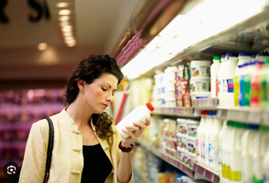
With Wemove, our initiatives' pillar, we have organized initiatives to motivate society and the sector to get involved in this circular journey. This is where we initiate educational campaigns for conscious consumption and proper waste disposal, new technologies with potential impact for the recovery of plastic waste, and circular design, which helps to redesign products from their conception.
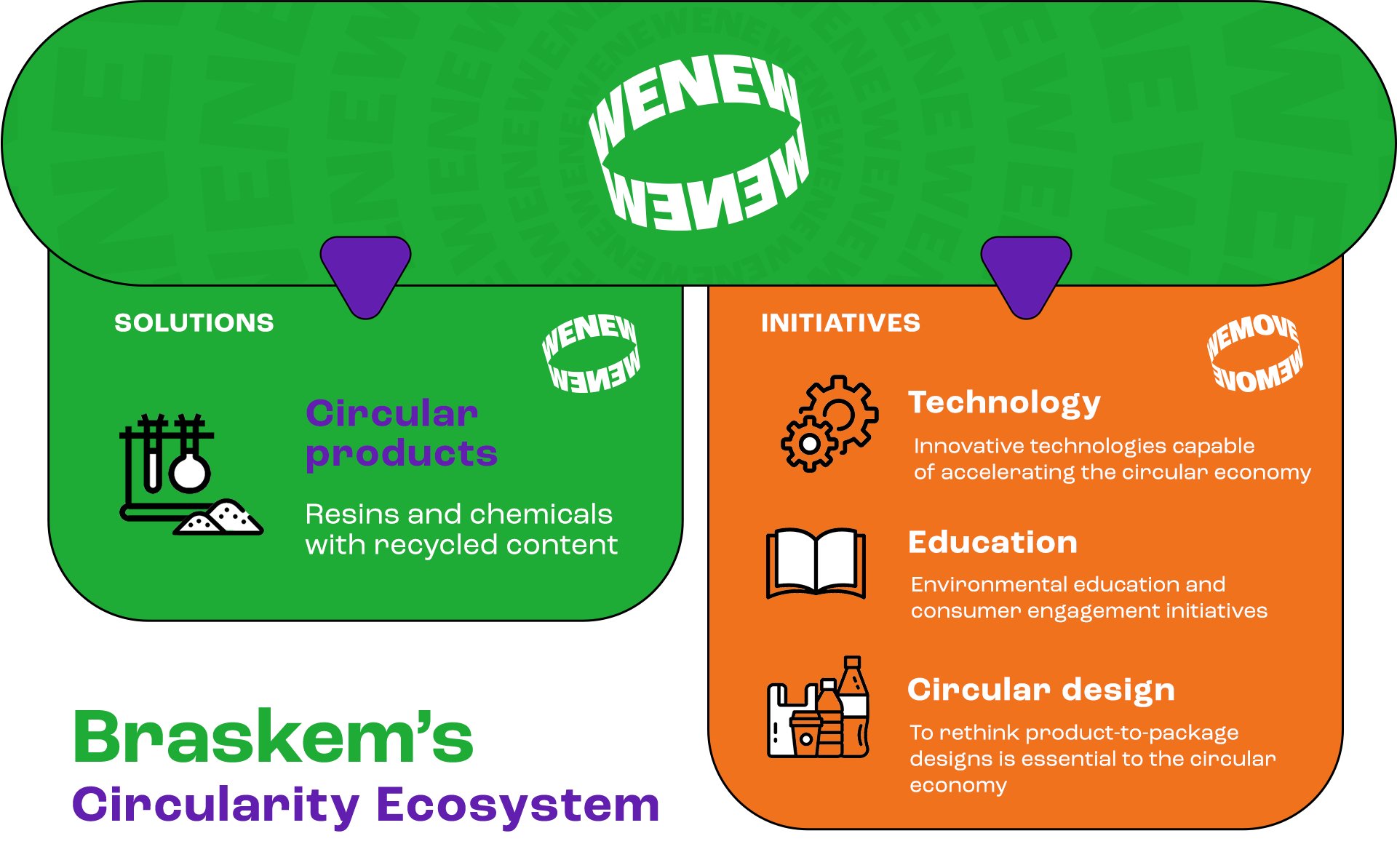
Circular products and sustainable portfolio
This is where our circular solutions come in, designed to be part of the products that everyone consumes on a daily basis. They are resins and chemicals produced from recycled waste and designed to meet the needs of the market, particularly our customers and partners.
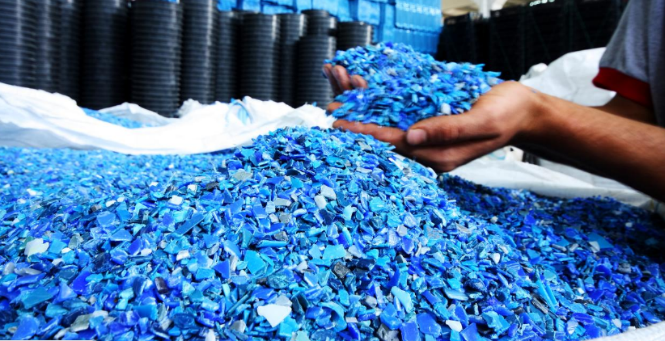
Our global portfolio now includes over 50 grades of sustainable solutions. In 2023, we launched PVC composites, produced from recycled raw material, and EVA with recycled content, which is now available on the market. We also have circular chemical options, which are expanding for the development of products with increasing quality and diversity of application. You can find out more about our products here .
Partnerships to develop the production process
Our strategy for transitioning to a circular economy is based largely on mechanical and chemical recycling solutions. Part of this strategy is helping to push our goal of eliminating 1.5 million tons of waste from the environment and expanding the production and sale of products with recycled content to 1 million tons by 2030.
To carry this out, it is vitally important to invest in partnerships, innovations and new technologies on these fronts. We have followed this recipe and have reaped some positive results from these investments. Below are a few examples of them:
- Wise Plásticos S.A.: in 2022, we acquired 61.1% of the company's - one of the leading Brazilian players in mechanical recycling - capital stock. Through this acquisition, we intend to invest to help Wise reach 50,000 tons of production capacity by 2026, thereby contributing greatly to our commitments to promote and enhance recycling in Brazil.
- Upsyde: Braskem and Terra Circular's joint venture originated Upsyde, which focuses on converting hard-to-recycle plastics into higher-quality and higher-value products, such as pallets and highway signs. A disruptive innovation that used proprietary "waste-to-parts" technology, filling a gap in the market and with very promising results.
- Vitol: in 2023, Braskem announced the acquisition of raw material derived from Vitol's plastic waste, produced by the company Waste Plastic Upcycling A/S (WPU), in Denmark, to increase its portfolio of circular products. This initiative will play an important role in our commitment by expanding our product portfolio with recycled content.
In addition, once it's up and running, the project will provide relevant technological advances in chemical recycling, which will positively impact Braskem's goal of eliminating plastic waste because, through chemical recycling, more complex plastics can be reused via mechanical recycling.
Advances
Circular design
Did you know that 80% of a package's impact is decided at the product's design stage? That's why rethinking product and packaging design is fundamental for responding to the challenges of the circular economy.
We need to innovate in current production processes so that all links in the chain get involved and also to make this operation scalable. One good example is the packaging project developed for the brand Organosolví, which I spoke about recently here
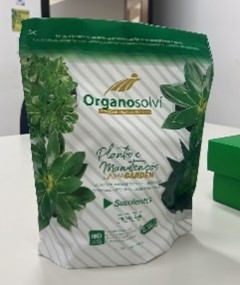
It was produced with post-consumer recycled resin (PCR) from our Wenew portfolio. Cazoolo, our circular packaging lab, and Antilhas, a packaging manufacturer, were respectively responsible for the design and manufacturing. The partnership in this endeavor has resulted in the creation of 100% circular packaging, capable of having a positive impact on the environment and society as a whole. The product is now available to the consumer.
Education: environmental initiatives
One of our primary goals is to generate a social impact through recycling. This is why we promote actions to encourage conscious consumption and proper disposal of waste with the consumers.
We currently have more than 10 global initiatives underway. For example, in Brazil, we have Plastitroque , which focuses on education about the proper disposal of each type of waste; our measures to encourage recycling and conscious consumption at festivals such as Lollapalooza, Rock in Rio and The Town, and a partnership with Ibirapuera Park in São Paulo , where we were able to hit the park's goal of being zero waste after just one year of running (the expectation was to achieve this goal by 2025).
In 2022, we saw over 370 tons of plastic recovered, more than R$15 million invested in environmental education programs and more than 600,000 people taking part in the initiatives and becoming agents of change for our future.
Through Wenew, we are committed to transforming the current economy model to a more circular one. However, we understand that we still need the engagement of even more people in order to achieve a more sustainable future. So we invite you all to join us on this journey. Let's do this together!
Learn about Wenew and join us in this movement: https://www.braskem.com/wenew/home-en




